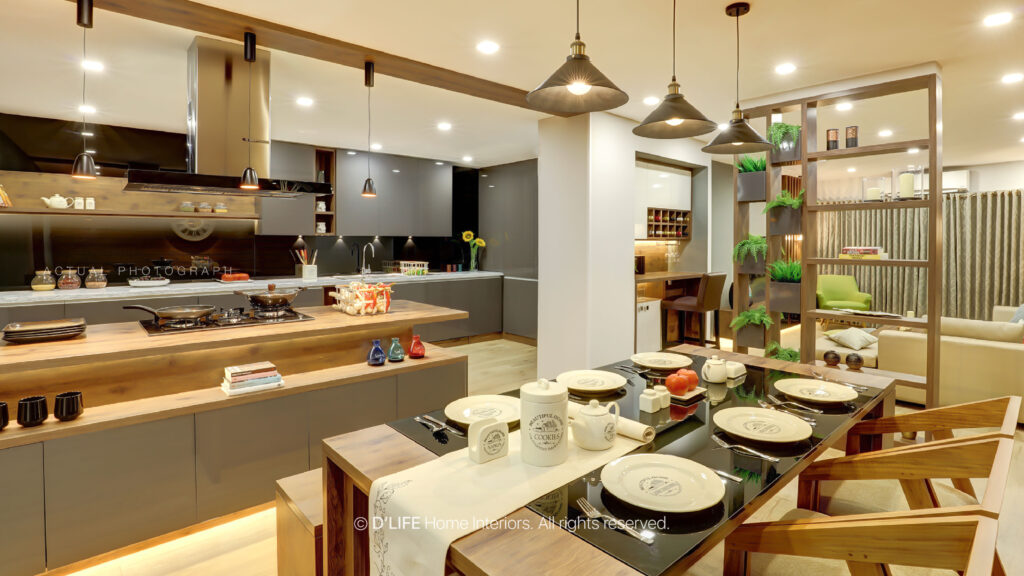In an era where environmental consciousness is more critical than ever, adopting eco-friendly practices isn’t just a trend; it’s a responsibility. Our homes, where we spend a significant portion of our lives, present an excellent opportunity to make a positive impact on the planet. By implementing sustainable strategies within our living spaces, we can contribute to preserving natural resources, reducing carbon footprints, and creating healthier environments for ourselves and future generations. Living an eco-friendly lifestyle begins with a mindset shift towards sustainability and conscious consumption. It’s about making mindful choices that prioritise the well-being of the planet alongside personal comfort and convenience. Here are some practical ways our interior designers in Chennai integrate eco-friendly practices into homes:
Sustainable Home Design and Architecture
Opt for energy-efficient designs that maximise natural light and airflow, reducing the need for artificial heating and cooling. Consider utilising recycled or renewable materials in construction to minimise the environmental impact. Energy-efficient appliances and lighting
Invest in Energy Star-rated appliances and LED lighting fixtures, which consume significantly less energy than their conventional counterparts. Though LED fixtures may seem expensive when compared to regular bulbs, they save quite a lot of money and are durable. Consider installing solar panels and reducing the use of conventional energy sources. Simple changes like switching to motion sensors, programmable thermostats, and smart refrigerators can also contribute to energy savings. You can also try implementing smart home automation systems in order to optimise energy consumption. This smart system can manage the lighting, cooling, and electronic devices based on the environment or human capacity in the room.
Water conservation techniques
Freshwater resources across the world are on the decline. Due to industrial activities, population growth, and vast urbanisation, many of us are facing severe water pressure. In fact, many of the urban landscapes depend on water tankers or government pipes that can transport water. Install low-flow faucets, showerheads, and toilets to reduce water consumption. Harvest rainwater for outdoor use and consider implementing greywater recycling systems to reuse water from sinks and showers for irrigation.

Eco-Friendly Materials and Furnishings
Choosing eco-friendly materials and furnishings helps to reduce environmental impact. Choose sustainable, non-toxic materials like recycled wood, accessories, and bamboo flooring for furniture, flooring, and decor. Some eco-friendly decor and accessories include glass tables in your dining room and opting for stone features in your kitchen. Look for products certified by government organisations for low chemical emissions. Remember that choosing eco-friendly furnishings doesn’t mean sacrificing style. Many of the interior designers offer long-lasting and sustainable products that offer stylish and welcoming furniture pieces.
Waste reduction and recycling practices
In 2024, we are generating more garbage than ever, and we have come to a phase where we don’t know what to do with it. Irresponsible disposal of garbage can result in polluting the environment, posing a public health risk. Practice the three Rs—reduce, reuse, and recycle—to minimise household waste. Compost organic matter like food scraps and yard waste to create nutrient-rich soil for gardening.
Indoor air quality and natural ventilation
Proper ventilation can help control airborne contaminants and indoor humidity, which can contribute to health hazards. Correct ventilation in your home can help reduce the spread of airborne diseases and difficulties as it brings fresh air to a room. Improve indoor air quality by using natural cleaning products and investing in air-purifying plants. Ensure proper ventilation to reduce the buildup of pollutants and allergens indoors.
Creating a Green Outdoor Space
Design an eco-friendly landscape with native plants that require less water and maintenance. Implement permeable paving and rain gardens to reduce stormwater runoff and promote groundwater recharge. Practice organic gardening techniques like mulching and companion planting to nourish the soil and naturally deter pests. Minimise the use of chemical pesticides and fertilisers to protect local ecosystems.
Eco-Friendly Cleaning and Maintenance Practices
Utilise environmentally friendly cleaning products or make your own using simple ingredients like vinegar, baking soda, and essential oils. Adopt a preventative approach to home maintenance to prolong the lifespan of appliances and systems. You can also engage with your local community to share knowledge and resources on sustainable living practices. Support businesses and organisations committed to environmental stewardship and advocacy.
Embracing eco-friendly living in your home is not just about making individual changes; it’s about being part of a larger movement towards a more sustainable future. By adopting mindful practices and making conscious choices with the help of the best interior designers in India or architects, we can transform our homes into havens that nurture both ourselves and the planet.


















